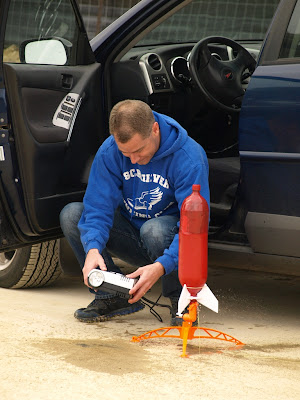The weather was warm with a gentle breeze as we all parked on an empty cul-de-sac that is on the edge of my neighborhood's soon to be developed area. This seemed the perfect launch site, as there are no houses nearby, and a large, freshly plowed dirt field where houses will someday be planted was the anticipated landing site for rockets as they descended back to earth.
Several of us brought rockets to launch, although I was the only one to bring a water propelled variant. I carefully put the drinkable fuel in my spacecraft, carefully created using a 2 liter water bottle and a hobby kit, placed it on the launch pad, then attached the air compressor to pump it up to 80 psi. Unfortunately, I didn't get the clamp that holds the rocket down properly secured, so it lifted off when the pressure had built up to only 20 psi (and yes, the requisite jokes were made about the premature lift off by several in the crowd).
Fortunately, I came prepared with enough water in a travel mug for two launches, so I refilled the rocket, made sure the lever was clamped all the way down, and started pumping the air in. It quickly became apparent that something was wrong. The rocket began leaking fuel almost immediately. I'm glad it was only water, but I was only able to wait until 50 psi, then had to launch for fear of losing too much fuel. So much for the eco-friendly portion of the day's activities.
Once I was done demonstrating my lack of engineering skills, we were on to the real show. We started with the biggest rocket of the day. We had been talking about what we should launch into space for weeks, and had finally settled on a fish. Only one of the guys who showed up actually brought a rocket with a payload section, and he made up for everyone else's lack of imagination by bringing not one, but two zebrafish He was so excited that he couldn't even wait for me to get my camera ready, but fortunately one of the other guys got a photo before he ignited the thruster.
The rocket had a D engine, which was rated to put it up to around 1600 feet. Watching it shoot into the sky was a thing of mesmerizing beauty, although I can only imagine it had to be the worst day of those fishes' lives. The big question on everyone's mind was, would they survive launch and reentry?
The rocket went up and up and up, and finally it reached its peak and the orange parachute deployed. We watched as it slowly floated back towards earth, gently drifting over the dirt field as it descended. As we continued to watch it come down we began to realize just how high it had gone. It just kept floating, occasionally drifting faster as a gust of wind caught it. It soon became apparent that it would land at the far end of the field. Then we realized it might make it into the edge of the trees. Then it just kept going. When it finally settled down below the tree line out of sight, we headed in the direction where we had last seen it coming down, looking forward to recovering the swimming aquanauts inside (or at least we hoped they were still swimming).
Try as we may, we were unable to find the rocket. I even went back and scoured the woods for another 3 hours over a couple of additional days. While I found lots of cow bones, and a second rocket we lost that day, I never found the silver rocket with its space pioneers. I suppose the only thing worse than unexpectedly pulling 10 gs is slowly running out of oxygen while hanging from a tree somewhere lost in the woods. Every great space program has its tragic losses, and we experienced ours right off the bat. We will forever be haunted with questions. What if we had cut a hole in the parachute so that it came down faster? What if we had better pointed the rocket to fly into the wind? What if we had used heavier fish?
We didn't let the tragedy keep us down, as we went on to launch many more rockets, and recovered all but one of them. We're already looking forward to our next launch day in a few weeks, and planning on putting some more lucky creatures into orbit. Or at least into the lower troposphere. We have even given our club the moniker of PETA - People for the Extra-terrestrial Transport of Animals. Hopefully next time will be more successful.
If you look closely, you can see the fuel spilling everywhere. I fixed this later by adding a second gasket. If you look less closely you can see both of the areas where my hair is thinning. I have no fix for that.
We tried to launch 3 at once. It didn't turn out as spectacularly as envisioned. They all 3 went, just with a 10-15 second delay between each one.
This 2 stager didn't have a parachute, just streamers. The wind had picked up so much by this time that I found it about a half mile away while looking for our first rocket. The rocket had a Zelda theme; when we couldn't find it we dubbed it "The Missing Link".
The fish had to go through an intensive screening and training process prior to being selected as the first aquanauts for our rocket club. They had no idea what was coming. That was probably for the best.



